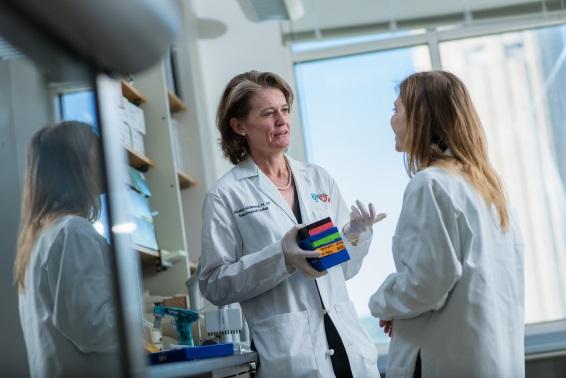Beth Mittendorf, MD, PhD will lead new Stand Up To Cancer research team
Beth Mittendorf, MD, PhD, director of the breast immuno-oncology program at Dana-Farber/Brigham and Women’s Cancer Center, will lead a new Stand Up To Cancer research team charged with investigating potential new therapies for a challenging type of breast cancer.
The team led by Mittendorf, consisting of researchers and clinicians from cancer centers around the country, will investigate therapies to help prevent recurrence of triple-negative breast cancer (TNBC), which is a disease in which the cancerous cells have tested negative for three receptors: hormone epidermal growth factor receptor 2 (HER-2), estrogen receptors (ER), and progesterone receptors (PR). The lack of receptors in the cancer cells means that hormone therapy and certain medicines that target the receptors are ineffective in treating the disease.
“Our goal is to find those patients for whom the existing therapy isn’t enough and who are at high risk of having the cancer recur after initial treatment,” Mittendorf said. “We hope to target microscopic cancer cells with medicines that are specifically designed to help inhibit immune escape mechanisms or signaling that leads to proliferation of cancer.”
TNBC is very aggressive and prone to spread from the breast after initial treatment with radiation, chemotherapy, and/or surgery, leading to metastatic disease for which no cure has been developed. The team plans to use blood analysis (“liquid biopsy”) to detect micrometastatic disease before it can take hold in distant organs and treat it with a combination of medicines.
The team will test a combination of ipatasertib and atezolizumab against TNBC.
Angela DeMichele, MD, co-leader of the breast cancer research program at the Abramson Cancer Center of the University of Pennsylvania in Philadelphia, will serve a clinical lead for the team.
The team is supported by SU2C Catalyst Founding Collaborator, Genentech, a member of the Roche Group, under the SU2C Catalyst® initiative.
SU2C Catalyst is a collaborative program that leverages the pharmaceutical, biotechnology, diagnostic, and devices industries to accelerate the development of new treatments, and combination therapies, to patients as rapidly as possible through early-phase clinical trials or translational research. These teams bring the total number of SU2C Catalyst Research Teams to 16. SU2C’s Scientific Partner, the American Association for Cancer Research (AACR), will provide grant administration for these teams.
Media Contacts
If you are a journalist and have a question about this story, please call 617-632-4090 and ask to speak to a member of the media team, or email media@dfci.harvard.edu.
The Media Team cannot respond to patient inquiries. For more information, please see Contact Us.
